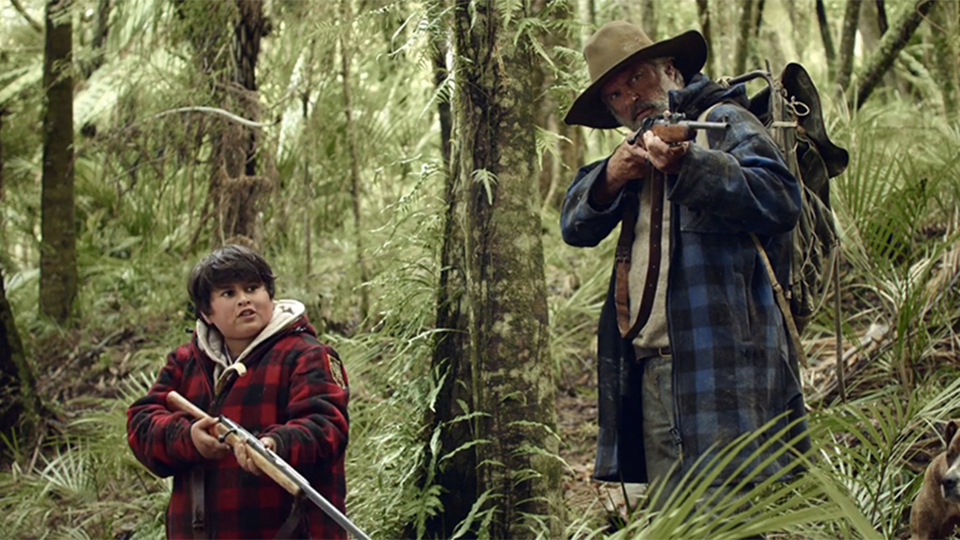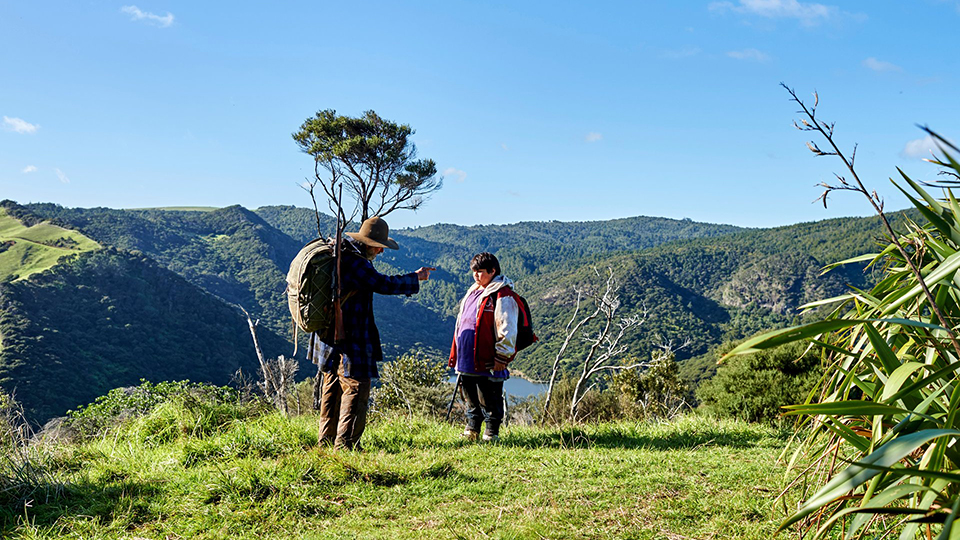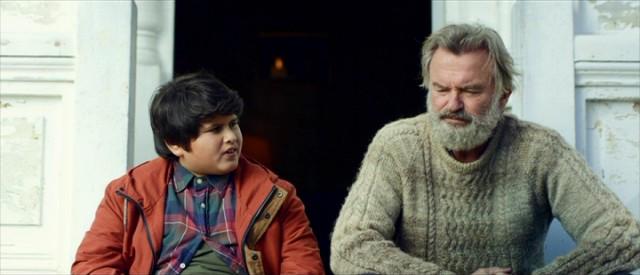Coming at the mid-point of our Resilience film series is Hunt for the Wilderpeople, a wonderfully quirky and family-friendly romp written and directed by Taika Waititi (director of Thor: Ragnarok and What We Do in the Shadows). Adapted from the book Wild Pork and Watercress, written in 1986 by the late Kiwi novelist Barry Crump, Hunt for the Wilderpeople is a charming film that was brought to life by the unique vision of its creators, resulting in a funny but poignant story that leaves audiences both visually and narratively satisfied.

Ricky (Julian Dennison) and Hec (Sam Neill)
Wilderpeople follows that familiar odd-couple formula of troublesome kid foisted upon a grumpy and begrudging adult, but Waititi’s distinctive voice never allows the film to become a stale stereotype. When wannabe gangster Ricky Baker (Julian Dennison) arrives at a run-down farmhouse on the outskirts of the dense New Zealand bushland, it’s his last chance at a foster home before being shipped off to juvenile prison. This adolescent “bad egg” has gotten into “graffiti-ing, littering, smashing stuff, burning stuff, breaking stuff, stealing stuff, throwing rocks…” but the kindly Bella (Rima Te Wiata) is convinced she can handle the boy. She allows him to run away each night, knowing he won’t get far before coming back for breakfast in the morning, and ensures his bed always has a heated water bottle waiting for him.
Ricky soon begins to soften under her enthusiastic maternal influence, but Bella’s gruff husband Hector (Sam Neill) doesn’t want anything to do with the boy and continues to keep his distance. It appears as though Ricky’s life has finally taken a turn for the better, but tragedy soon strikes and an unfortunate sequence of events render Ricky and Hec stuck together in the vast New Zealand wilderness. Throughout the film the duo are pursued by police, game hunters, wild pigs, and the increasingly unhinged child protection officer Paula (Rachel House), whose mantra “no child left behind” gathers comic intensity as the hunt drags out month after month. But even in the first few minutes of the film, these characters are brought to life by the surprising amount of emotional weight Waititi brings to even the most comedic of situations.
Shot in various remote locations on the north island of New Zealand, Wilderpeople makes great use of the striking scenery. Dense bushland, snow-peaked mountains, and remote lakes are all gorgeously depicted, with many aerial shots worthy of a nature documentary. A mock operatic musical score underlines the comedic but tense evasion of authorities, and the bursts of well-choreographed action are woven seamlessly into the flow of the narrative. Waititi handles the combination of jokes, heartwarming moments, and ridiculously over the top car-helicopter-tank chases with a characteristic self-assurance that pays off in a gratifying way.

Director Taika Waititi on set of Hunt for the Wilderpeople
Hunt for the Wilderpeople is a beautiful display of Waititi’s technical competence. The New Zealand backdrop does a lot to make the film look great, but his continual use of low-key lighting on characters is intentionally used to complement the way the landscape itself is characterized. It accentuates some of the film’s key themes, like abandonment, and makes the film beautiful to look at. Adding to its visual appeal, the film uses a lot of natural lighting, which further contributes to the crisp and picturesque New Zealand landscape the film spends so much of its time flourishing in.

Ricky and Hec in the middle of the New Zealand bush
However, it’s the story and the characters that makes Hunt for the Wilderpeople so unique. The story is impulsive and riveting with a sense of humor which ushers it along at a brisk pace and makes it all the more enjoyable. Waititi’s comedy is sprinkled through the film with what feels like a great deal of ease, but at the same time Hunt for the Wilderpeople was created with complete sincerity in its story and characters. From the very beginning, as the aerial camera pans across the incredible landscape of the New Zealand wilderness, the film is excellent in its execution of a fun and enjoyable narrative, with well-rounded and memorable characters. The film is moving and sentimental, but at the same time it flows so naturally that the viewer can’t help but be swept along for the ride.

The chemistry between Ricky and Uncle Hec feeds the resilience for their growing relationship
Hunt for the Wilderpeople is a film that has the potential to sound rather cliché when describing it. Afterall, it’s another coming-of-age tale, complete with a troubled teen and a man who never thought he’d become a father figure. And yet Waititi’s film shines through with grounded characters, witty dialogue, compassionate filmmaking, and inventive storytelling. Hunt for the Wilderpeople is consistently clever and moving, and Waititi’s way of exposing characters’ individual vulnerabilities creates a film that is unique despite its familiar roots. Hunt for the Wilderpeople can be enjoyed both as a quirky comedy and as an in-depth look at coping with loneliness and tragedy. Surviving in the “bush” and coming out of it with a new purpose in life serves as a test of resilience for both Ricky and Uncle Hec. Waititi’s focus on companionship is something that crops up a lot in his films, but its depiction in Wilderpeople really speaks to the idea that people are stronger together than alone.

Recent Comments